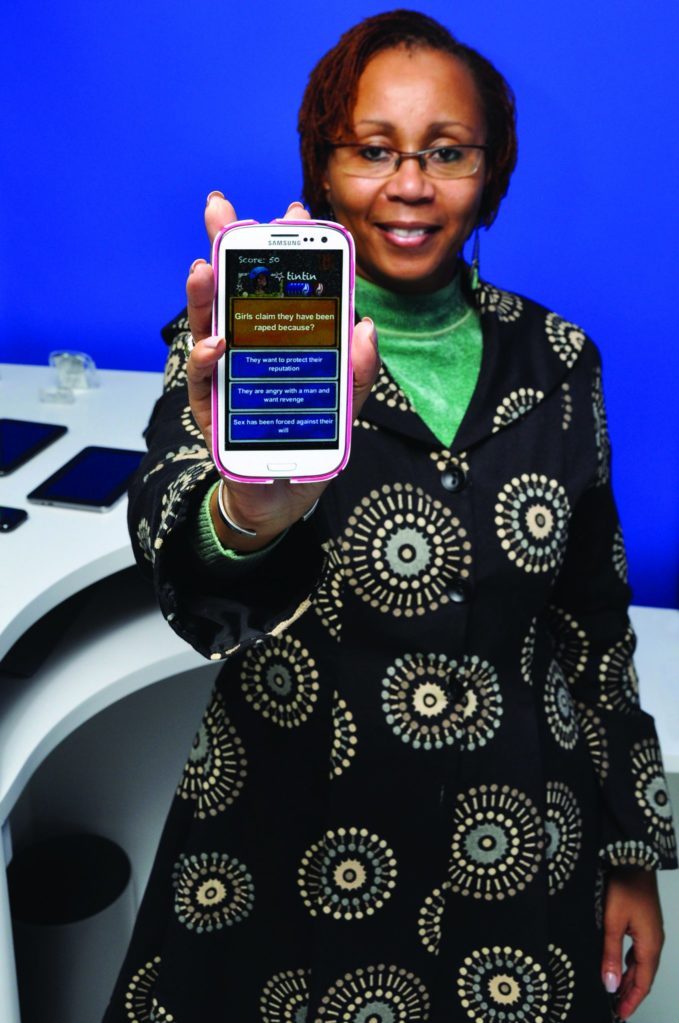Four years ago, Anne Githuku-Shongwe watched her teenage son play a video game called Civilization. The game challenged him to rebuild civilizations and imagine different scenarios. In his mind, he became King Mansa Musa, the ancient leader of the Malian Empire. As he excitedly explained what he was doing, his mother got an idea.
“It all came together at that minute through observing my son. It was a learning by doing approach, and I saw how powerful the visual and interaction process was,” she says.
Even before she saw her son playing the game, Githuku-Shongwe wanted to create a platform that would shape the mindset of young Africans, by equipping them with life skills.
“Whenever, I saw young boys and girls on the streets in Senegal, Rwanda or Kenya, I would ask myself, ‘How can you teach them if they can’t use the traditional learning routes?’ Also, conversations with my children on their role models like Hannah Montana, Bill Gates or Beyoncé had me worried that the youth weren’t being exposed to positive African media content. I wanted to create a sort of virtual learning academy that could hold their attention span. Gaming using African content was the answer.”

Loading...
This saw the end of her 15-year career with the United Nations, as an advisor on Africa’s development, and she began forging ahead as an entrepreneur.
“A colleague made a $1,000 bet with me that I would be back in six months. He gave me big brother advice by using examples of people who had left cushy jobs at the UN and returned shortly,” she says.
Determined to have the last laugh, she began studying games and managed to get a grant from the Kellogg Foundation for research. Combined with her savings, she was ready to build her social enterprise.
“I knew that to reach the masses in an affordable way, we had to use mobile phones, as Africa has the highest penetration rate in the world, especially among the youth. The games are free for the end user, with partners such as Ford Foundation, UN Women, Nokia and Vodafone paying for the costs,” says Githuku-Shongwe.
Today, Afroes—a play on the words ‘African’ and ‘heroes’—creates African mobile and online video games and applications for fun interactive learning. Afroes has built a series of mobile games with more than 450,000 players in South Africa, Kenya, and Ghana and further afield in India, Indonesia, Guyana and the Caribbean.
Her first game, Champs Chase, was developed in partnership with the Nelson Mandela Children’s Fund during the 2010 FIFA World Cup—to extend the Champions for Children campaign that protects children from abuse. The players took on the role of a character that had to save other children from harmful situations and predators.
Moraba is another award-winning mobile game that addresses difficult questions of gender-based violence and challenges players to contemplate their beliefs about sexual relations and sexual violence. The most recent release Haki: Chaguo Ni Lako, meaning Justice: the choice is yours, in Swahili, was designed to inform and empower the Kenyan youth to make wise choices when they went to the polls in March.
“We have made great strides, won several awards with the five games and have a full-time team of nine based in Kenya and South Africa, but it has been tough and we have many more milestones to achieve. Our biggest challenge is not only creating awareness on the power of ‘gamification’, but having our clients understand the cost of technology,” says Githuku-Shongwe.
She gets numerous requests from organizations to create games, but once the quote is received, many are surprised. And they still have to build the player-base through marketing and promotion.
“In the digital marketing world, it is a tough sell, but we know that you can push stronger engagement and brand loyalty through a ‘gamified’ product,” she says.
On every project, she works with a contracted team of 15 to 20 called ‘Mobiv8tors’, whose responsibilities are data collection, distribution, promotion and getting feedback from players.
Githuku-Shongwe is adamant that Afroes isn’t a short-term project but a marathon.
“When I meet a lot of techpreneurs in Africa, I sense that they are in a hurry for quick success to get the Facebook or Google effect. They come up with one product—it fizzles out and then move to grab onto the next one. We need to create digital solutions for the future of Africa by thinking ahead strategically. This requires a huge long-term investment and a motivation that’s bigger than quick success.”
Her focus is to build a learning academy that is gamified so as to push relevant content and introduce organizational learning for corporates, rather than be involved in game campaigns.
The question that remains is whether she collected on her $1,000 bet.
“I approached my former colleague 18 months after I began. He was shocked that I was still in the game and offered to take me out for lunch. It wasn’t a $1,000 lunch but I have proved I am here to stay.”
Loading...








